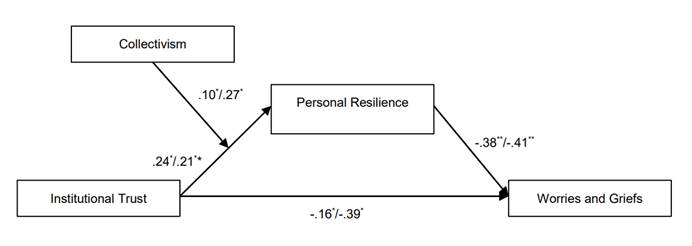The COVID-19 pandemic has lasted for three years. Psychological research has established that the pandemic brings people negative emotions such as panic, worries, and anxiety, leads to an individual incorrect perception of information, destroys physical and mental health, and results in maladaptive behaviors such as panic buying, work-family conflict, and withdrawal behavior. Looking back on the three years of the pandemic resistance, different people have different psychological and behavioral reactions. Who is better adapted to the pandemic and group crisis? Some pandemic-related studies have indicated some individual characteristics. For example, Kim et al. (2016) found in the study of the Ebola virus that collectivists have a better sense of pandemic prevention efficacy than other people. Is the adaptation of collectivists to hold together for heating suitable for COVID-19 and even general group crises?
This research examines how institutional trust can reduce individual worries and griefs by enhancing personal resilience during the COVID-19 pandemic and even in general group crises, through both surveys and experiments. The above relationship is found to be stronger in the collectivist group. That is, people with high levels of collectivism tendencies are more likely to benefit from institutional trust.

On Dec. 19th, 2022, a new study of “How and When Institutional Trust Helps Deal with Group Crisis like COVID-19 Pandemic for Chinese Employees? A Social Perspective of Motivation” was published in Current Psychology by Dr. Jiajin Tong, assistant professor of School of Psychological and Cognitive Sciences, Peking University. This research received financial support from the Foundation of Beijing Key Laboratory of Behavior and Mental Health.
Research Link: https://link.springer.com/article/10.1007/s12144-022-04149-w


